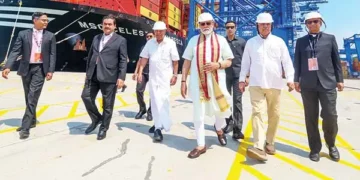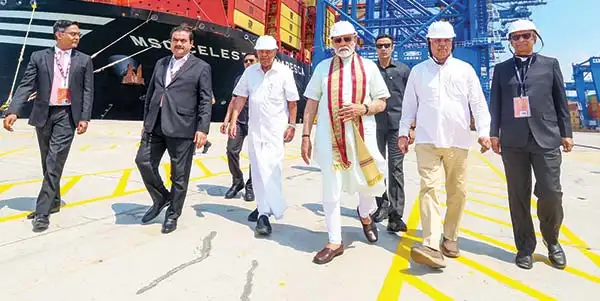Blitz Bureau
THE Vizhinjam International Deepwater Multipurpose Seaport, located in Kerala, stands as a monumental achievement in India’s maritime infrastructure. Inaugurated by Prime Minister Narendra Modi in May this year, this Rs 8,800-crore project underscores India’s commitment to enhancing its port capabilities and fostering economic growth through strategic maritime initiatives.
Vizhinjam was chosen for the development of this multi-purpose port because of its strategic location near international shipping routes, which significantly reduces transit times for vessels, making it a pivotal point for maritime trade. As one of India’s few natural deepwater ports, it can efficiently accommodate large cargo and container ships, thus making it an ideal choice for this development.
Among the key features of the Vizhinjam Seaport are: it is India’s first dedicated container trans-shipment port; strategically located near one of the world’s busiest sea trade routes; the port boasts a natural deep draft of nearly 20 meters, enabling it to accommodate some of the world’s largest cargo ships; and the capacity of this transshipment port is expected to increase three times in the coming years.
The development of this port is expected to significantly reduce India’s reliance on foreign ports for trans-shipment, which previously accounted for 75 per cent of such operations, thereby retaining revenue within the country and creating new economic opportunities for Kerala and its people.
Vizhinjam benefits
Vizhinjam is set to become a key player in regional trade, potentially serving as a gateway for commerce between Southeast Asia, the Middle East, and Africa.
The Government of India’s initiatives like the Sagarmala Project and PM Gati Shakti, are aimed at enhancing port infrastructure and improving inter-connectivity of waterways, railways, highways, and airways. Over the past decade, investments under Public-Private Partnerships have upgraded Indian ports to global standards, reducing ship turnaround time by 30 per cent and doubling the capacity of ports. These efforts have positioned India among the top three countries globally in terms of seafarer numbers and among the top 20 in global shipbuilding.
For further strengthening India’s maritime sector, the Government is working towards the establishment of a shipbuilding and repair cluster in Kochi, which will create numerous employment opportunities. Additionally, initiatives like the Maritime Amrit Kaal Vision and the India-Middle East-Europe Economic Corridor, which was discussed during the G20 Summit, underscore Kerala’s critical role in global trade networks.

































